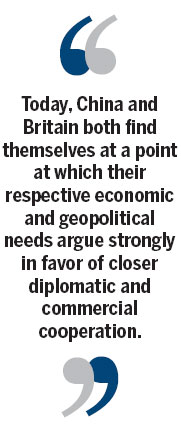Mission wheel turns full circle

Stronger Sino-British understanding can bring huge benefits for both sides
The visit of a large trade mission from the United Kingdom, led by Prime Minister David Cameron, brings to mind the first British trade mission to China, which left London in September 1792, laden with clocks, weapons and other examples of the best of British manufacturing, together with 84 members, including several senior military officers, six musicians and a painter.
On Sept 14, 1793, its leader, Lord Macartney, met the Chinese Emperor Qianlong in Rehe. The British wanted to develop trade relations with China to balance their huge imports of Chinese tea and reduce the amounts of silver that they were required to pay the Chinese tea traders.
But in 1793, the Chinese worldview did not include trade between equal partners. Macartney's trade mission met with incomprehension and failure, as did follow-up China trade missions a few years later from Britain and France.
The disappointing outcome to the mission did not change British dependence on the tax revenue from Chinese tea imports, which made a reduction of the Sino-British tea trade impossible at a time when Britain was just beginning its long war with revolutionary France, led by Napoleon.

After he returned from his China trip, Macartney described China as "an old, crazy fighting ship which a succession of able and vigilant officers have contrived to keep afloat for these hundred and fifty years past". The failure of the European and Chinese cultures to understand each other then had profound and tragic consequences that last even today.
But do the British and the Chinese understand each other better in 2013 than they did 220 years ago? The wheel of fortune has turned full circle, and the situation today seems very different. After many years of defeat, humiliation, civil war and poverty, China is resurgent.
After many years of strong economic growth, in 2013 China accounts for 15 percent of global output, and 43 percent of global economic growth. Britain, on the other hand, heavily indebted, and weighed down by economic dependence on its huge finance industry, still struggles to recover from the severe blow struck to its economy by the financial crash of 2008.
Shortly after he became prime minister in 2010, Cameron declared that he would work toward building stronger business relations with China. In spite of that, he met with the Dalai Lama in London in 2012, an act that he must have known was certain to upset the Chinese government. The meeting led in fact to an 18-month period when Cameron was unable to advance British business relations with China. Was Cameron badly advised? Or has China's continued emergence changed his mind?
An important factor in Cameron's new emphasis on a rapprochement with China may be that the five-year rule, which governs the terms of British government, means that a national election must be held by mid-2015. The continued weakness of the British economy and stubbornly high unemployment could reduce the election chances of Cameron's political party, the Conservatives.
Cameron knows that his party is ruthless in replacing its leaders who fail to win enough votes to govern. Meanwhile, in the stage wings stand candidates for Cameron's position, led by the mayor of London, Boris Johnson.
Today, China and Britain both find themselves at a point at which their respective economic and geopolitical needs argue strongly in favor of closer diplomatic and commercial cooperation. A resurgent China needs to integrate more fully with the rest of the world. China needs the platform in Europe and the high-value business know-how, particularly in services, which Britain can provide.
On its side, Britain needs an injection of Chinese business flair and money to reinvigorate its tired economy. China's rich, ancient culture, closely studied by Cameron on his recent visit to a Chinese art exhibition in London just before his trip, can inspire new achievements in Britain's highly creative and vibrant society.
In 1793, mutual understanding between China and Britain was impossible. Today, the circumstances in both countries support the successful achievement of a stronger Sino-British mutual understanding, with huge benefits for both sides.
The author is a visiting professor at Guanghua School of Management, Peking University.
(China Daily European Weekly 12/06/2013 page10)
Today's Top News
- Chinese landmark trade corridor handles over 5m TEUs
- China holds first national civil service exam since raising eligibility age cap
- Xi's article on CPC self-reform to be published
- Xi stresses improving long-term mechanisms for cyberspace governance
- Experts share ideas on advancing human rights
- Japan PM's remarks on Taiwan send severely wrong signal






























